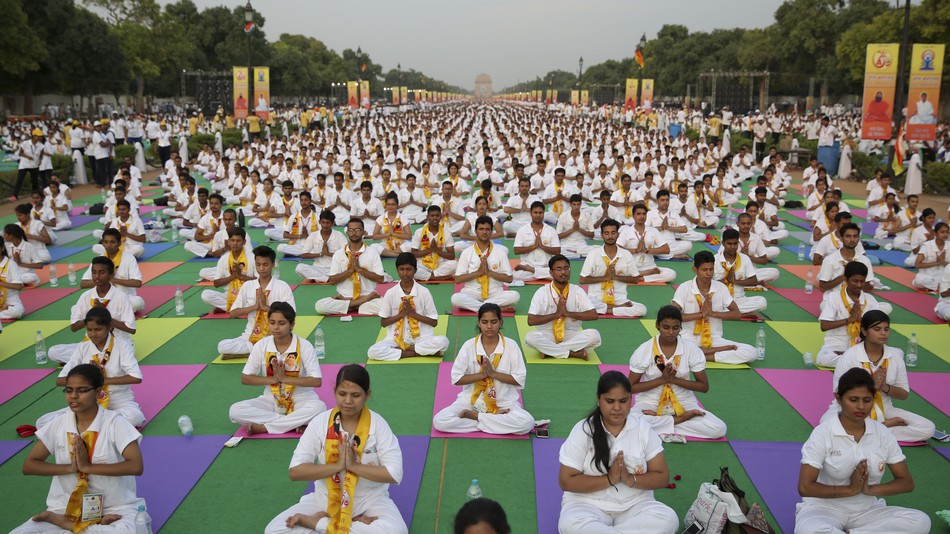A Student's Perspective: Are Indian Schools Becoming Government's Propaganda Parrot?
AKSHAT TYAGI

In reference to Smriti Irani … In a country where certificates are easily traded, the legitimacy of degrees is hardly something to write home about. In the post of HRD Minister, Smriti Irani received her share of criticism, most notably from quarters that alleged that under her, the centre increased interference in universities. The suicide of Rohith Vemula at Hyderabad Central University was one such tragic incident that was linked, by many, to interference by the HRD in that the ministry demanded that HCU take action against dalit protesters.
Irani was replaced with Prakash Javadekar, who may be outside of the media eye, but takes the laissez faire to the extreme, with no business whatsoever with education. He behaves more like the government’s propaganda spokesperson than like an education minister.
Together in three years, both the honourable ministers of Modi government have made CBSE, the schooling system and the MHRD, less about learning and education. Instead, they have magnified the nationalist doctrine inside these public institutions -- which are meant to be places of learning. Questions about dangers of standardisation, perils of rigorous testing, democratic schooling, and accommodation of diversity have been erased from the list of agendas. Schools and children have become the salespersons of central schemes and cultural ideology.
Promotion of Sanskrit was the first hint we received during Iraniji’s tenure. During mid-session in 2014, students of some 500 Kendra Vidiyalayas were effectively coerced into studying Sanskrit after German was removed as the third language option. Logistical constraints and Three Language Formula of 1988 were made scapegoats in a desperate withdrawal of a crucial choice system. Of course, children must be forced to get fluent in quintessential shlokas for melodramatic Parliament performances.
In 2014-15, CBSE suddenly began to embrace Atal Bihari Vajpayee, Pandit Deendayal Upadhyaya and Pandit Madan Mohan Malaviya , on whom it organised ‘CBSE Expression series’— essay writing competitions. The safe distance between politics and education was narrowed to obviousness.
Then from 2015 onwards, children became the marionettes of the government’s Yoga love. In absence of any yogic enlightenment, the ancient practice was made mandatory in CBSE and most state Boards. Informing in a written reply in Rajya Sabha in July 2015, AYUSH Minister Shripad Yasso Naik said yoga education had also been made a compulsory part of study and practice by National Council for Teacher Education (NCTE).
Further, there have been reports of how the novel Swachh Bharat campaign has turned children into government’s vigilantes. The push for making villages open defecation free at the panchayat level has resulted in high schoolers shaming their fellow villagers for not using toilets. This uncritically adopted humiliation tactic may cause only a limited reform in people’s sanitary habits, but will certainly prepare the next generation of hooligans.
During the demonetization gamble, whose benefits we cannot still ascertain, graduate students were made the ‘foot soldiers for digital awareness.’ The larger education machinery was exploited to change the narrative to Vittiya Saksharta Abhiyan after an embarrassing failure of the original objective.
The CBSE in May this year announced to have partnered with Unique Identification Authority of India (UIDAI) for its affiliated schools to act as ‘Registrar’ to collect demographic and biometric data for enrolling staff, teachers, children and their family members for the Aadhar card. When schools should really debate and discuss the repercussions of government making Aadhar mandatory for accessing several essential services or of letting central authority possess every detail of citizenry’s life— they’ve instead been made sarkari daftaars.
Instead of becoming democratic spaces of dialogue, schools have been systematically made more compatible to the authoritarian traits of this regime. Shiv Vishvanathan once explained the easiest way to destroy democracy is to destroy childhood. And BJP seems to be doing just that.
Its assault on higher education centres has not escaped public scrutiny but its recent structural changes in the schooling system have been largely been ignored. The re-introduction of Boards in class X, the standardisation of assessment in lower classes at CBSE schools, adoption of uniform result patterns, National Achievement Survey among other major decisions are, not coincidently, very aligned to the philosophy of Hindutva.
Both diversity and democracy are regarded as threats by the RSS. It wants to homogenise not just the demographic but also different knowledge systems, pedagogies, histories et al. It wants a standardisation of childhood and education, so to control it via fewer central authorities and create more obedient citizens. Forget giving autonomy to learners, it wants to begin by snatching away even the little independence enjoyed by different education Boards, schools and teachers.
School students cannot mobilise, agitate or even complain. They are expected to be docile, leasing their thinking jobs to adults. And perhaps, this is why we need to be more careful about our schools. We must empower our children to speak up, to call out the naked emperor of education.
(Akshat Tyagi is the sixteen year old author of 'Naked Emperor of Education,’ India's first young voice against the schooling model).



